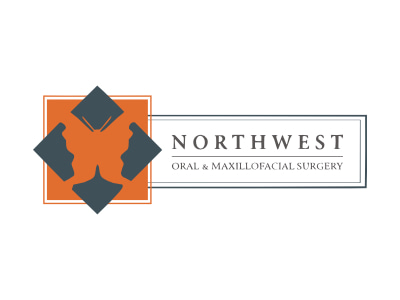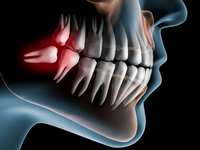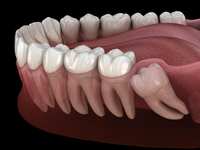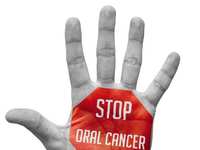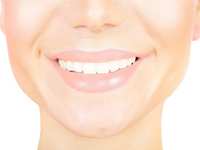- Categories :
- More
Frequently Asked Questions About Wisdom Teeth

Wisdom teeth, also known as Third Molars, are located in the very back of your mouth on both the top and the bottom. These teeth typically erupt between the ages of 17 - 25, which lends to their name - you are wiser by the time they break through. While it’s believed that these third molars had a purpose at one point, they are now considered vestigial, meaning your mouth and jaw will perform well without them. While many dentists recommend having wisdom teeth removed, not everyone needs to have this procedure. Below, review three questions you may have about wisdom teeth, along with our take. 
The current position statement from the American Academy of Oral and Maxillofacial Surgeons (AAOMS) states
“…third molar teeth that are associated with disease, or are at high risk of developing disease, should be surgically managed. In the absence of disease or significant risk of disease, active clinical and radiographic surveillance is indicated.”
This statement clearly recognizes that while not all third molars require surgical management, given the documented high incidence of problems associated with third molars over time, all patients should be evaluated by someone experienced and expert in third molar management.
Given that we cannot confidently predict what the future holds for all patients with asymptomatic, disease-free teeth, we must rely on the oral surgeon’s experience and expertise in recognizing the likelihood that pathology will develop and his or her ability to communicate this in realistic terms to the patient.
What Are They Looking For to Guide Their Decision?
Several factors can influence the recommendation to have wisdom teeth removed. Some considerations are, placement of tooth in jaw, space available, and eruption status. Available jawline space is important because, the wisdom teeth can push on other teeth in the back and can cause crowding within the mouth. If there is not space in the mouth for your wisdom teeth to come in, or if it looks like your wisdom teeth are going to come in at an angle and damage your other teeth, it is best to remove them. For those with more space in their mouth, there may not be a need to remove the teeth. Your dentist’s x-rays can provide helpful information in making the decision.
What Are the Risks if You Don't Have Your Wisdom Teeth Removed?
It’s documented that an “absence of symptoms associated with third molars does not equate to the absence of disease.” Poorly formed soft tissue can lead to bacterial infections and eventually affect maxillary sinus structures and adjacent teeth. Many dental professionals recommend removing the wisdom teeth in your mid to late teens or early twenties. In a best-case scenario, if there is room in your mouth for these teeth to come in, you may feel discomfort as the teeth break through the gums. The worst-case scenario results in an impacted wisdom tooth; this occurs when the tooth is coming in at an angle and pressing on other teeth, or it is unable to break through the gums. Impacted wisdom teeth can be extremely painful and can lead to swelling in your mouth and in your jaw region.
The upper wisdom teeth can also impact your sinuses. Depending on the length of the tooth’s root, wisdom teeth may be adding pressure to your sinuses. If you have constant headaches or feel congested, even when it’s not allergy season, wisdom teeth may be a contributing factor.
Why Do Dentists Recommend Having Wisdom Teeth Removed Before Issues Occur?
There are potential consequences for retaining your third molars. Should you and your doctor decide to keep your molars, routine checkups and active surveillance should take place to ensure your needs don’t change. If the decision is made to remove your wisdom teeth, it is preferred to go through this procedure in your late teens or early twenties when the roots of the wisdom teeth are softer and less developed. This makes them easier to remove. Additionally, it prevents the pain of the teeth coming in. Finally, even if your wisdom teeth do come in properly, they are hard to care for. They are at the back of your mouth, where a toothbrush can be challenging to fit. These teeth are susceptible to cavities and decay, so removing them early on typically makes sense for your overall dental health.
If you are looking to learn more about wisdom teeth, Northwest Oral & Maxillofacial Surgery can help you. We can determine the current positioning of your wisdom teeth and how much space you have in your mouth, to determine if your wisdom teeth should be extracted and removed. We can also perform the oral surgery needed to remove these teeth before they cause any problems. Contact us today to schedule an appointment with one of our dental professionals.

